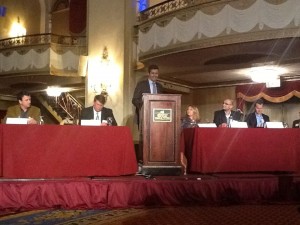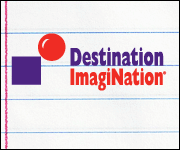 Over 400 people gathered in Boston to hear about the future of NFC, or Near Field Communications from panelists from PayPal, Verizon, semiconductor company NXP and payment solutions provider Ingenico.
Over 400 people gathered in Boston to hear about the future of NFC, or Near Field Communications from panelists from PayPal, Verizon, semiconductor company NXP and payment solutions provider Ingenico.
NFC is an emerging standard that allows you to “tap” your mobile devices to execute a secure purchase or initiate any other number of functions that mobile devices can do. The event, sponsored by The M.I.T. Cambridge Enterprise Forum and Mobile Monday Boston (#MoMoBoston) was a kickoff for the NFC Boston Cluster: a new entrepreneurial initiative featuring new companies and emerging applications.
One start-up showed an application that allows you to find a parking garage with available spaces. Then, just tap your phone when you enter and the garage knows you’re there. Tap your phone at the parking spot and the phone remembers where you car is. Another tap on the way out, approve the price and you are off. Take this to the next level and regular parking meters could be a thing of the past. Come to think of it, most register based behaviors may be making the migration to memories over the next 15 years.
“We are in the era of touch and gesture”, according to PayPal’s Patrick Gauthier. “If we are invoking data or applications not [just] at the checkout but everywhere else then we have a winner… If we just try and reproduce … what has been done with a wallet we are wasting our time.” The real question becomes “What can you do to reduce the time between consideration and purchasing.”
A video featured how PayPal and NFC can “ping” a customer as they walk by a store to get a discount, and leverage their social networks to seamlessly extend discounts to the customer’s friends. Today, November 8, 2011, PayPal has upgraded its Android platform to accept NFC P2P (peer-to-peer) payments between phones. [story | demo]
“Stores are decreasing checkout lanes because it’s dead space. If this [NFC] can speed up the time to purchase, it will succeed. “Once it goes beyond the checkout, it will explode.”
The focus of the panel was on the consumer experience, because even B2B companies will have to focus on the consumer and their needs. The social networks of individuals will improve or damage a company’s ability to compete even quicker, so the addition of the social layer to the purchase layer will be a growing feature: It becomes its own real-time referral (or anti-referral) feature.
“If you try and control the consumer, you will lose”, according to Gauthier. “You must compete for the consumer.”
“There are only three things certain in life: death, taxes and NFC”, according to Verizon’s Aditya Khurjekar. He cautioned not to get hung up on exactly HOW NFC will fit into the buying cycle. “If we try and create the ROI model and use cases now, we will fail. 7 years ago, we tried to think of the ROI of the camera on a phone. The smart entrepreneurs came up with the great use cases” and it does so much more than was originally envisioned.
This is, in fact, a new wallet, or maybe even several wallets in one phone. Khurjekar said that “You have been trained to carry a phone for the last 20 years. You have carried a wallet for the last 20.000 years”. A ‘swipe’ being replaced by a tap is not a reason to change. There will have be other reasons.
One of the panelists explained how Angry Birds is using NFC on certain Nokia phones to make the game playable in real world places. [Story]. “Now THAT will get my kids excited about NFC.”


I would really like to have a chance to play the angry birds game based on location. On the more important side from a security perspective I can’t imagine how they will handle this but it will create a lot of work for my security peers for sure if it is done well.
Thanks for sharing!
Thank you Raúl! I would like to play an AR (Augmented Reality) version Angry Birds soon as well. Glad you enjoyed the post, and thank you for commenting!.